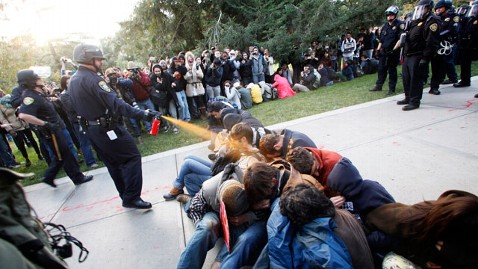What to Do If You Get Pepper Sprayed

Credit: Wayne Tilcock/The Enterprise/AP Photo
If you come into contact with pepper spray, experts say the best thing to do is first, calm down. Then, find some water to rinse your eyes out with.
“It’s quite painful and the [intense burning] can last a while,” said Robert J. Kaminski, an associate professor in the department of criminology and criminal justice at the University of South Carolina.
He said members of law enforcement had told him they could still feel the burning sensation for a couple of days and that even a shower could irritate the skin over again.
Pepper spray, an irritating substance extracted from the cayenne pepper plant, has made headlines in recent weeks as cameras have captured police spraying it on Occupy protesters in New York City and more recently at University of California, Davis.
Pepper spray comes in two forms — as a fogger and as a stream. Kaminiski said the pepper spray used on the UC-Davis protesters appeared to be more of a mist or fog.
“The strength of police-issued pepper spray is stronger than what you can get as a civilian,” Kaminski said. “Foggers have particles that are fine. When you inhale, they will get into the lungs and irritate them [and] cause coughing. Streamers can still impact the lungs, but to a less significant degree.”
According to a fact sheet from Vandenberg Air Force Base, pepper spray “causes instant pain and closing of the eyes caused by swelling of the eyelids.” If inhaled, the spray causes “swelling inside of the nose, mouth, sinuses and other mucus membranes.”
Although the spray’s strength depends on the manufacturer, the Scientific American said that on the Scoville scale, which measures a pepper’s heat, pepper spray ranked hotter than the cayenne and the habanero.
This weekend, two campus officers and the campus police chief at UC-Davis were put on administrative leave after a video captures the two officers dousing seated Occupy protesters on the campus with pepper spray.
The president of the University of California system said he was “ appalled” at the images. And last month, a New York Police Department officer was disciplined after violating guidelines when he used pepper spray on Occupy Wall Street protesters in September.
Kaminski said that the use of pepper spray by law enforcement was controversial in the 1990s because it was thought to be linked to people dying after being exposed.
Nowadays, he said there more concerns about people with asthma or the pressure from the spray damaging a person’s eye or someone suffering an injury or even dying after being incapacitated.
The Vandenberg Air Force Base in California offered these tips if pepper spray gets into your eyes:
- Wash the exposed area with soap and water to remove all oils and dirt, which might entrap the irritant.
- Flush the exposed area profusely with cold water three to five minutes.
- Keep the washed areas exposed to fresh air to allow the irritant to evaporate.
- Do not apply oil or grease medications. They could further trap the irritants.
- Do not bandage the exposed areas.
- Keep the area exposed to fresh air.
- An ABC News staffer suggested also sucking on half a lemon to relieve the effects of inhaled pepper spray.